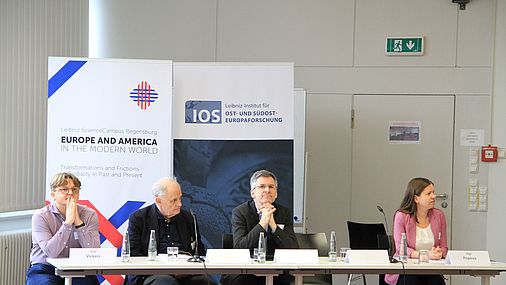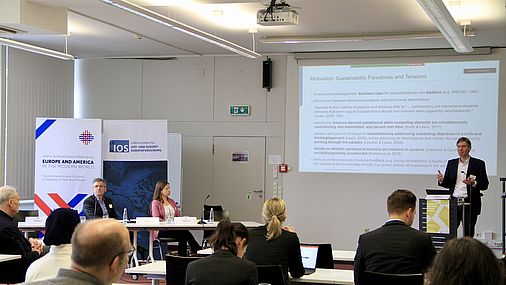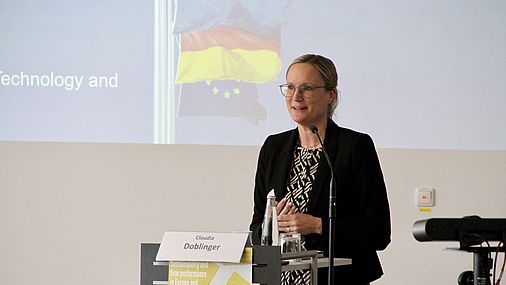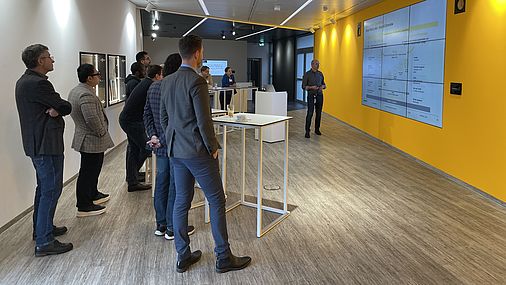Sustainability and Business Dynamics
Exploring firms, green behavior, and global challenges at the 2023 Annual Conference of the Leibniz ScienceCampus Regensburg
30 January 2024
The United Nations Sustainable Development Goals provide a global roadmap for reducing inequality, improving institutions, and enhancing economic growth while addressing climate change. This presents both opportunities and challenges for firms worldwide, spanning technological development and the reorganization of value chains. The business world must respond to the green energy transition and the implementation of environmental, social, and corporate governance. The most recent Leibniz ScienceCampus (LSC) Annual Conference in Regensburg focused on various aspects of this change, covering a range of topics to generate a better understanding of the role of sustainability in firm behavior and performance.
The LSC Europe and America in the Modern World is a joint project of the Leibniz Institute for East and Southeast European Studies (IOS) and the University of Regensburg (UR); the conference organizers Olga Popova Ph.D. (Senior Researcher, Economics Department IOS) and Professor Dr. Thomas Steger (Chair of Leadership and Organization, UR) are also co-coordinators of the LSC research module Trade and Institutions. Their conference program aimed to explore firms of all sizes and their performance in the field of sustainability.
 At the Annual Conference of the Leibniz ScienceCampus Regensburg: (from right) Conference organizers Olga Popova (IOS) and Prof. Dr. Thomas Steger (UR) with Prof. Dr. Hartmut Lehmann (IOS Academic Vice-Director, Head of Economics Department), and Dr. Paul Vickers (Manager of the LSC). © LSC | Photo: Gresa Morina
At the Annual Conference of the Leibniz ScienceCampus Regensburg: (from right) Conference organizers Olga Popova (IOS) and Prof. Dr. Thomas Steger (UR) with Prof. Dr. Hartmut Lehmann (IOS Academic Vice-Director, Head of Economics Department), and Dr. Paul Vickers (Manager of the LSC). © LSC | Photo: Gresa Morina
This exploration included examinations of energy transition, green entrepreneurship, corporate social responsibility, ethics issues, and sustainable business models. Keynote lectures and contributions to conference panels discussed these themes by focusing on practical insights. The presenters here often presented case studies from various parts of the world, demonstrating how global problems and processes are locally inflected.
A visit to the Continental Automotive Technologies GmbH site in Regensburg provided valuable insights into how business players and major enterprises address sustainability issues at multiple scales: from employees‘ everyday practices through to corporation-wide strategies. Interesting insights were provided by the two keynote speakers Professor Dr. Marcus Wagner (Chair in Management, Innovation and Sustainable Business, University of Augsburg) and Professor Dr. Claudia Doblinger (Associate Professor in Innovation and Technology Management, Technical University of Munich, Straubing Campus).

Keynote Speaker Prof. Dr. Marcus Wagner at the LSC Regensburg Annual Conference. © LSC | Photo: Gresa Morina
Employee Green Behavior
Marcus Wagner spoke about Employee Green Behavior (EGB): The investigation of EGB is on the rise as researchers seek to comprehend how employees can actively contribute to the “greening” of their organizations. While antecedents of EGB have gained significant scholarly attention, the challenges and tensions arising when individuals participate in voluntary EGB have yet to be thoroughly explored, Wagner argued.
Utilizing survey data collected from 388 respondents across 74 teams, the primary findings of his empirical study highlight that voluntary EGB plays a pivotal role within teams, pointing to a ‘task-conflict nature’ of sustainability-related tensions at work. The researchers indicate that voluntary EGB is a major driver of the salience of tensions in business teams at companies.
Wagner’s findings underscore the social context in which voluntary EGB unfolds: employees’ focus appears to shift away from questioning whether they are willing to engage towards determining in which green activities they should participate, considering resource constraints while striving to achieve a common goal.
 Keynote Speaker Prof. Dr. Claudia Doblinger at the LSC Regensburg Annual Conference. © LSC | Photo: Gresa Morina
Keynote Speaker Prof. Dr. Claudia Doblinger at the LSC Regensburg Annual Conference. © LSC | Photo: Gresa Morina
Climate-tech Start-ups
UR-Alumna Claudia Doblinger explored in her talk what drives climate-tech startups to proceed and what role (governmental) partners assume in this process. Accelerating innovation in clean energy technologies is a policy priority for governments around the world aiming to mitigate climate change and provide affordable energy. While most research has focused on the role of governments financing research and development and steering market demand, there has been a more limited understanding of the role of direct government interactions with startups, Doblinger said while demonstrating how such interactions can increase innovation.
While working at the Harvard Kennedy School after finishing her doctoral studies in Regensburg, Doblinger explored the situation of climate-tech startups in the USA. There are plenty, but mostly, they do not find their way into the market: “Despite high attention to climate-tech-mitigation technologies, investment in climate-tech is still limited,” she argued. Development cycles in the field of climate technology take even longer than, for instance, in the pharmaceutical branch, with the likelihood of crossing the notorious “valley of death” in the context of climate-tech startups remains low.
In her research, Doblinger has explored the role of governmental partners and the role of innovation agencies, specifically the U.S. Advanced Research Projects Agency – Energy (ARPA-E) program. Direct technology and licensing collaborations between climate-tech startups and government partners have been shown to enhance startup patenting and follow-on financing more effectively than comparable collaborations with private firms or universities, Doblinger said. While private companies may offer superior market linkages, they often exhibit predatory behavior, “akin to sharks”. At universities, a conflict of interest tends to govern and restrict the commercialization of federally funded research.

Participants of the LSC Regensburg Annual Conference during their company visit at the Continental Automotive Technologies GmbH. © Continental Regensburg| Photo: Verena Hymon
twa.
Information/Contact
Dr. Olga Popova, Leibniz Institute for East and Southeast European Studies, Economics
Prof. Dr. Thomas Steger, University of Regensburg, Faculty of Business, Economics and Management Information Systems
Leibniz ScienceCampus Europe and America in the Modern World
Leibniz ScienceCampus research module Trade and Institutions




